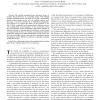Free Online Productivity Tools
i2Speak
i2Symbol
i2OCR
iTex2Img
iWeb2Print
iWeb2Shot
i2Type
iPdf2Split
iPdf2Merge
i2Bopomofo
i2Arabic
i2Style
i2Image
i2PDF
iLatex2Rtf
Sci2ools
533
click to vote
CAMAD
2015
IEEE
2015
IEEE
Bayesian game analysis of a queueing system with multiple candidate servers
—We combine queueing theory and game theory to evaluate the performance of a queueing system with multiple strategic candidate servers. The intent is to model a transmission system where packets can be sent via multiple options, each incurring a cost and controlled by a distributed management. Our purpose is to analyze the effects of the presence or the lack of both cooperation and communication between servers. The mathematical characterization of the uncertainty about the characteristics of the transmission alternatives available is captured through a Bayesian game formulation. In this setup, we compute both the Price of Anarchy, quantifying the inherent inefficiency arising from selfish management of each server, and the Price of Stability, which is the loss due to distributed system management, under different conditions of signaling exchange among the servers.
| Added | 17 Apr 2016 |
| Updated | 17 Apr 2016 |
| Type | Journal |
| Year | 2015 |
| Where | CAMAD |
| Authors | Anna V. Guglielmi, Leonardo Badia |
Comments (0)

